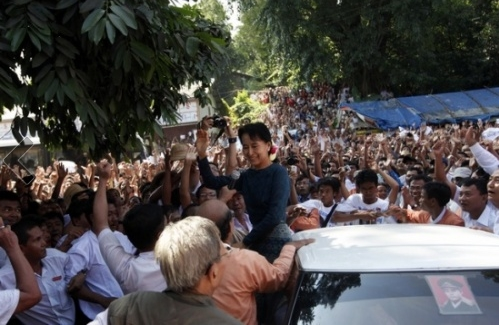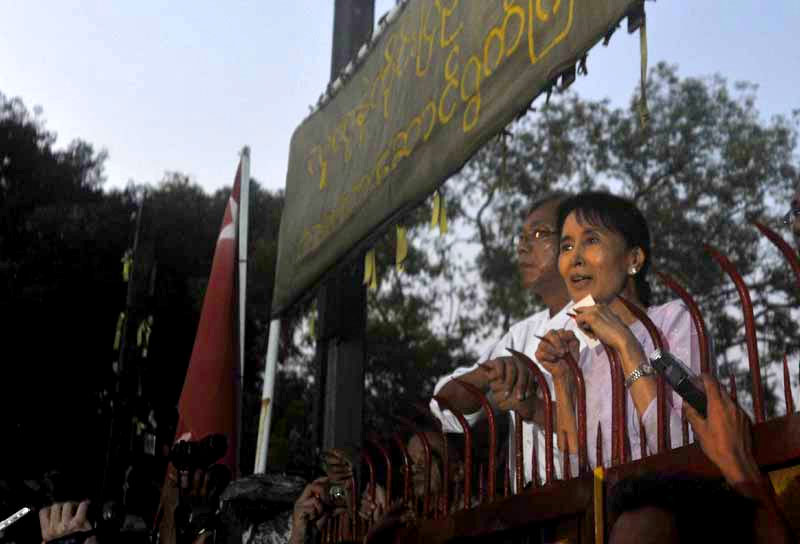Blog (446 found)
Donate this Holiday Season
With the holiday season directly before us, those wishing to support the amazing work of Burma’s human rights and relief organizations might consider the groups below.
Happy holidays from all of us at Burma Partnership […]
• • •Daw Aung San Suu Kyi Works To Make Reconciliation in Burma a Reality
In the month following her release from more than 15 years of unjust captivity over the last 21 years, Daw Aung San Suu Kyi has demonstrated through words and actions why she continues to be a powerful force for social and political progress. While the State Peace and Development Council (SPDC) has maintained its authoritarian command to gain greater personal profit and perpetual military rule, Daw Aung San Suu Kyi has displayed even handed leadership in the nation’s struggle for democracy, ethnic equality and inclusive development. Daw Aung San Suu Kyi’s efforts not only underscore the flaws of the SPDC’s unilateral “Roadmap to Democracy,” but also illuminate a real path towards national reconciliation […]
• • •Civilians in Danger as Election-Related Armed Conflict Continues in Eastern Burma
Since Burma’s fraudulent elections on 7 November, Thailand has seen the largest influx of civilians from Burma fleeing into the country in more than a decade. On 8 November alone, 25,000 civilians fled from fighting in the town of Myawaddy and another 10,000 crossed from Three Pagoda Pass. In the weeks following the initial outbreak of violence, the armed conflict, along with flows of fleeing civilians, has continued. The volatile situation illustrates the damage done by the SPDC’s authoritarian process to entrench military rule through their “Roadmap to Democracy” and their failure to facilitate genuine national reconciliation. Just as democratization in Burma requires global support, a collective, international effort is needed to ensure the protection of civilians under threat in Eastern Burma […]
• • •Abuses of Government Authority During Elections Highlight Un-Rule of Law in Burma
“Although we don’t like the USDP, all the villagers including me voted for the USDP since we were ordered by the town authorities to vote for the USDP. We were afraid while we were voting since the authorities were watching on us at the polling station, to see if were voting for them or not.”
– A voter in Shan State
Throughout the elections, the regime exercised gross abuses of authority in a widespread attempt to dominate and manipulate the elections to their advantage. From publically supporting the regime-backed Union Solidarity and Development Party (USDP), to employing the Union Election Commission to unlawfully influence voters, to forcing vast numbers of voters to support the USDP or face consequences such as fines, demotions, or arrests, the regime was involved in the elections at all levels. The Election Commission’s blatant favoritism highlights the way in which the elections have been structured to further the regime’s plans to entrench military rule. Certainly, the regime’s handpicked Election Commission and undemocratic election laws are indicative of the severe lack of rule of law in Burma – where laws are structured to be used against the people, rather than to protect their rights […]
• • •Daw Aung San Suu Kyi Speaks with Amnesty International
On 24 November, Daw Aung San Suu Kyi spoke via telephone with Amnesty International Malaysia, and answered some questions from youth activists from the Asia-Pacific region. She called on youths abroad to continue to campaign for the release of all of Burma’s political prisoners, and raise awareness about human rights violations in the country. Daw Aung San Suu Kyi also spoke about increasing communication between youths inside Burma and abroad, and maintaining pressure on all ASEAN countries to help bring genuine democracy to Burma. Listen to the interview here.
• • •Burma’s Elections Marked by Violence, Intimidation and Ethnic Inequality
Burma’s November elections took place in an environment marred by widespread violence and intimidation as the regime sought to exploit the pervasive climate of fear in Burma to ensure complete control over the electoral process. Intimidation and threats were carried out in the lead up to the elections, in order to ensure a lack of a viable political opposition and to guarantee ‘popular support’ for regime-backed parties. These threats proved to be largely successful, and when they were not, the regime often followed up the threats with repercussions. Such election related human rights violations took place across the country, but were noticeably worse in ethnic areas, highlighting the regime’s long-standing policy of ethnic discrimination and persecution. This disregard for ethnic rights has translated in heightened tension between ethnic communities and the central regime, and an associated risk of increased armed conflict in ethnic areas.[…]
• • •DASSK’s Freedom, Development, and Human Worth
As the world has been watching Burma with the renewed interest since the release of Daw Aung San Suu Kyi, it is important to recall her ideas and perspectives on promoting democracy, development and human rights in Burma and other third world countries – some of what makes her such an important leader […]
• • •Daw Aung San Suu Kyi’s Long Awaited Release Brings Unity and Hope
 Daw Aung San Suu Kyi’s emergence from house arrest following the expiration of her wrongful detention sentence has caused a ripple effect across Burma’s political scene. Unable to keep the democracy leader under detention any longer according to their own laws, the regime’s inability to manipulate the political environment in this situation has brought about a greater potential for political change that their fraudulent elections ever did.
Daw Aung San Suu Kyi’s emergence from house arrest following the expiration of her wrongful detention sentence has caused a ripple effect across Burma’s political scene. Unable to keep the democracy leader under detention any longer according to their own laws, the regime’s inability to manipulate the political environment in this situation has brought about a greater potential for political change that their fraudulent elections ever did.
Democracy Leader Daw Aung San Suu Kyi Finally Free; Supporters Celebrate and Call for Guarantees of her Safety
 Today marked the end of Daw Aung San Suu Kyi’s most recent term of seven years under house arrest as Burma’s military regime finally released the democracy leader upon the expiration of her sentence. Thousands of National League for Democracy (NLD) members and her supporters gathered outside of her house to catch a glimpse of their beloved leader on this historic day. The crowd cheered elatedly as she emerged from her house. People wept for joy, danced and celebrated to long awaited release of the democracy leader. “We must work together in unison to achieve our goal,” she said, reiterating her timeless commitment to unity and peace.
Today marked the end of Daw Aung San Suu Kyi’s most recent term of seven years under house arrest as Burma’s military regime finally released the democracy leader upon the expiration of her sentence. Thousands of National League for Democracy (NLD) members and her supporters gathered outside of her house to catch a glimpse of their beloved leader on this historic day. The crowd cheered elatedly as she emerged from her house. People wept for joy, danced and celebrated to long awaited release of the democracy leader. “We must work together in unison to achieve our goal,” she said, reiterating her timeless commitment to unity and peace.
‘The Lady’ retains potent political role
 Tomorrow, Aung San Suu Kyi will have spent a total of 15 years and 20 days in detention. Under Burmese law, she should be released, and it is looking increasingly likely that she will be. Although the regime has a poor track record of keeping its word or upholding its own laws, the regime will want to divert attention away from last Sunday’s sham elections which perpetuate military rule, and give the international community a fig leaf.
Tomorrow, Aung San Suu Kyi will have spent a total of 15 years and 20 days in detention. Under Burmese law, she should be released, and it is looking increasingly likely that she will be. Although the regime has a poor track record of keeping its word or upholding its own laws, the regime will want to divert attention away from last Sunday’s sham elections which perpetuate military rule, and give the international community a fig leaf.
The regime has played it well from their point of view – legally they should have released her when her period of house arrest expired last year, but then, conveniently, American Mormon John Yettaw came to the junta’s aid, swam across the lake, and landed Suu Kyi with three years’ hard labour. In an act designed to appear compassionate, Than Shwe reduced this to 18 months’ house arrest – conveniently timing her release for six days after the sham elections.[…]









 All posts
All posts